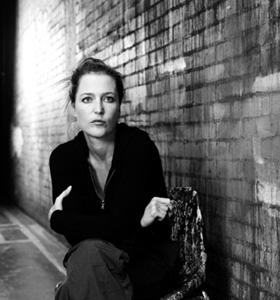
25
March 2004 - 15 May 2004 Evening Performances: Monday - Saturday 7.30pm Saturday Matinees: 3, 10, 17, 24 April, 1, 8 and 15 May 3.30pm Mid-Week Matinees: 29 April 3.30pm Royal Court Theatre Back to GA.ws |

|
Reviews Gate (London) April 10, 2004 By Timothy Ramsden Not the neatest thing in Gilman’s oeuvre, but splendidly produced and acted. While other theatres work their way through well-known Arthur Miller and Tennessee Williams, the Royal Court brings us modern US playwright Rebecca Gilman, someone able to combine social discussion with narrative tension. This play, though, has a lower social quotient, while after a splendid start its story tends to dwindle into the fantastic. Artist Dana Fielding suffers a breakdown; her boyfriend, aged 40, wants more out of life than her work-bent existence allows, and the new exhibition doesn’t open encouragingly. Being self-employed Dana has no job-linked access to decent health insurance, and her cheap policy chucks her out of psychiatric hospital before she feels ready to cope. So far, so gripping, with Gillian Anderson’s Dana registering a flurry of art-world falseness and career disillusion her nervous system’s increasingly unable to cope with through flinching gestures and ideas instantly rejected. Watching this is the kind of thrilling experience a fine actor with a first-rate director alone can give, as she stands isolated amid Hildegard Bechtler’s cruel, clinically white space, or invaded by others in the tighter gallery setting. Between them Anderson and director Ian Rickson give Gilman’s play the best shot imaginable, alongside, especially, John Sharian. He’s nebulous as Roy, the lover (so’s the part) but ace as stalker-psycho Gary, with his calm manner, instructional approach to conversations and self-perception. It’s Gary’s suggestion that Dana extend her hospital stay by the only way insurance rules allow, claiming to believe she’s someone else. None other than Darryl Strawberry, professional player who had the sweetest swing in baseball. It’s a sport Dana knows next to nothing of; the switch to comedy as she covers this up neither works itself nor prepares for later scenes when the question is – or might be – how much she finds shelter in this alter ego, for whom she alters posture and voice. It’s here Gilman’s plot goes arbitrary, as the art world rediscovers Dana – critics somehow re-evaluate her and her ‘gallerist’ Rhonda (doubled with a disbelieving medic by tactfully unsympathetic Nancy Crane) is entranced by Dana’s new ‘Darryl’ paintings. Credibility’s left the asylum by now, and it’s down to Anderson’s brilliantly understated, yet ever-clear, performance to carry conviction. |